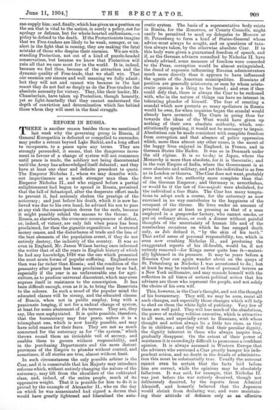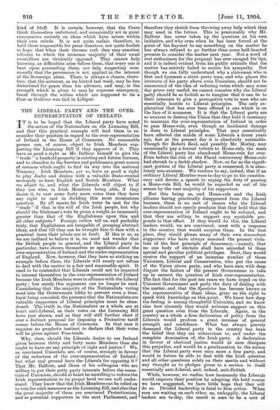THERE is another reason besides those we mentioned I_ last
week why the governing group in Russia, if General Kuropatkin is defeated or compelled to surrender, may prefer a retreat beyond Dike Baikal, and a long effort to recuperate, to a peace upon any terms. They are strongly persuaded, it seems, that the dangerous move- ment in favour of a change of system will not commence until peace is made, the soldiery not being discontented until the Army has acknowledged itself defeated ; and they have at least one clear and definite precedent to quote. The Emperor Nicholas I., whom we may describe with- out impertinence as a much stronger man than the Emperor Nicholas II., and who reigned before a partial enlightenment had begun to spread in Russia perceived that the fall of Sebastopol, after the desperate effort made to prevent it, had seriously shaken the prestige of the autocracy ; and just before his death, which it is now be- lieved was due to his own hand, he advised his son to pass at any risk the emancipation decree for the serfs, because it might possibly rebind the masses to the throne. In Russia, as elsewhere, the economic consequences of defeat, or, indeed, of victory, are only felt when peace has been proclaimed, for then the gigantic expenditure of borrowed money ceases, and the disturbance of trade and the loss of the best elements of the population arrest, if they do not entirely, destroy, the industry Of the country. It was so even in England, Mr. James Wilson having once informed the writer that of all the years in English history of which be had any knowledge, 1816 was the one which presented the most acute forms of popular suffering. England even then was far richer than Russia; and the condition of the peasantry after peace has been proclaimed may be so bad, especially if the year is an unfavourable one for agri- culture, as to produce universal discontent, which may even express itself in resistance to the conscription. It has been difficult enough, even as it is, to bring the Reservists to the colours. In such a mood of the popular mind the educated classes will be strong, and the educated classes of Russia, when not in public employ, long with a passionate longing, if not for a radical change of system, at least for some abatement of its terrors. They are, they say, like men asphyxiated. It is quite possible, therefore, that the bureaucracy may fear peace, unless it is a triumphant one, which is now hardly possible, and may have solid reason for their fears. They are not so much concerned for the autocracy as for "the system," which throws round them an inviolable veil of secrecy, and enables them to govern without responsibility, and in the purchasing Departments and the more distant provinces of the Empire to plunder without control, and sometimes, if all stories are true, almost without limit.
In such circumstances the only possible arbiter is the Czar, and it is conceivable that his Majesty may introduce reforms which, without entirely changing the nature of the autocracy, may lift from the shoulders of the cultivated class, and, indeed, of the entire people, much of its oppressive weight. That it is possible for him to do it is proved by the example of Alexander II., who on the day on which he was assassinated, had signed a decree that would have greatly lightened and liberalised the auto- cratic system. The basis of a representative body exists in Russia, for the Zemstvos, or County Councils, might easily be permitted to send up delegates to Moscow or St. Petersburg to form a kind of States-General whose advice must always be sought, and on questions of taxa- tion always taken, by the otherwise absolute Czar. If to this body were given a guaranteed freedom of speech, and if, as the German advisers consulted by Nicholas II. have already advised, some measure of freedom were conceded to the Press, corruption would be almost extinguished, the dread of exposure influencing Russian administrators much more directly than it appears to have influenced the agents of the American municipalities. Russians of position are generally aristocrats, or men by whom aristo- cratic opinion is a thing to be feared ; and even if they ,could defy that, there is always the Czar to be reckoned with, who in the nature of things can have no interest in tolerating plunder of himself. The fear of creating a scandal which now protects so many spoliators in Russia would be over, for when inquiries began the scandal would already have occurred. The Czars in going thus far towards the ideas of the West would have given up nothing of their own absolute authority, which, con- stitutionally speaking, it would not be necessary to impair. Absolutism can be made consistent with complete freedom from corruption and that absence of police oppression which, more than almost any other cause, is the secret of the happy lives enjoyed in England, in France, and in German States like Baden. It was so in Denmark udder the old regime. It is so to-day in Japan, where the Monarchy is more than absolute, for it is theocratic; and in the vast Empire of India, where the Government is at once absolute and military, and yet the individual is as free as in London or Geneva. The Czar does not want, probably does not wish for, authority more complete than that of , the German Emperor; and Germany is, nevertheless, or would be if the law of lese-majeste were abolished, for the individual a free State. The Czar has many tempta- tions to adopt such a course, for the autocracy as now exercised in no way contributes to the happiness of the occupant of the throne. He lives under an amount of personal danger at least as pressing as that of a man employed in a gunpowder factory, who cannot smoke, or put on ordinary shoes, or cook a dinner without painful thoughts of the uncertainty of human life and of the numberless occasions on which he has escaped death only, as Job defined it, "by the skin of his teeth." That awful sense of personal responsibility, too, which is even now crushing Nicholas II., and producing the exaggerated reports of his ill-health, would be, if not entirely removed—for Kings never quite lose it—materi- ally lightened in its pressure. It may be years before a. Russian Czar can again wander about on the quays of St. Petersburg as Nicholas I. was accustomed to do ; but at least he may be rendered as free of personal terrors as a New York millionaire, and may console himself with the reflection in all times of serious political action that his advisers are those who represent the people, and not solely the choice of his own will.
This, however, is the Czar's thought, and not. the thought of his bureaucracy. They will, we may be sure, resist all such changes, and especially those changes which will help to shed on them the white light of publicity. Very few of them are well paid. They will lose much of the absolutism, the power of making volition executive, which is attractive to all men, and especially sweet to Russians, with whom thought and action always lie a little too close, as they lie in children ; and they will find their peculiar dignity, the dignity inherent in those who always inspire fear, gradually disappear. On the extent of their power of resistance it is exceedingly difficult to pronounce a confident opinion. It is always assumed in Western Europe that the advisers who surround a Czar greatly hamper his inde- pendent action, and no doubt in the details of administra- tion this must be substantially true. Usually the autocrat cannot even be certain that the facts laid before him are correct, while the opinions may be absolutely fallacious. It was said, for example, that Nicholas II.
was just before the war entirely deceived, though not deliberately deceived, by the reports from Admiral Alexeieff, and honestly believed that the Japanese would shrink from declaring war, and were maintain- ing their attitude of defiance only as an effective kind of bluff. It is certain, however, that the Czars think themselves unfettered, and occasionally act in great emergencies entirely on ideas which have arisen within their own minds. It is not quite unfair, therefore, to hold them responsible for great disasters, nor quite foolish to hope that when their thrones rock they may sanction reforms to which the immense majority of their usual councillors are virulently opposed. They cannot help knowing, as difficulties arise before them, that every one is bent upon persuading them, nor help suspecting occa- sionally that the persuasion is not applied in the interest of the Sovereign alone. There is always a chance, there- fore, that the autocrat, as we hinted last week, may be less disinclined for peace than his advisers, and may, in the strength which is given to men by supreme emergency, break through the withes which are supposed to tie a Czar as Gulliver was tied in Lilliput.











































 Previous page
Previous page